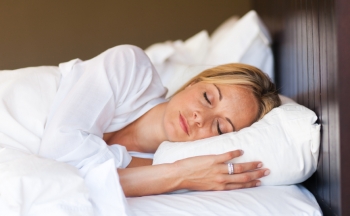Insomnia is not a disease but it is an indicator that something is wrong.

Lack of a good night’s sleep can
impact the on the way you feel, the way you work, the way you relate to people
and the way you cope with life. You find it affects your mood and you have mood
swings, or you can feel irritable or depressed. Some people have difficulty
concentrating and find they are falling asleep during the day or they just
aren’t thinking straight.
The body needs sleep to repair damage, fight infection and recharge energy. For a few unlucky people, sleep problems such as difficulty getting to sleep and waking frequently through the night and waking feeling tired, become a way of life. When these problems are prolonged it is known as insomnia.
Nearly everyone experiences a period of insomnia due to a worrying situation, such as worrying about an exam, a job interview or an unpleasant situation that needs resolving; Others common causes of sleep problems include overtiredness and jetlag, overeating, and under drinking.
While insomnia is not a disease; it is an indicator that something is wrong. The following 7 steps aim to soothe the nervous system and to re-establish a normal sleep cycle.
1. Pay attention to what you eat and drink
Don’t go to bed to full, you don’t want your body to be focusing on digesting, or go to bed hungry. Aim to drink one and half litres or 6 cups of water daily. Be cautious with nicotine, caffeine and alcohol, they have stimulating affects and take hours to wear of keeping you awake. As an alternative drink calming herbal teas such as chamomile or lemon balm. Dairy products, soya products and almonds contain tryptophan, which acts as a natural sleep inducer. Having a glass of warm milk/soya milk with a teaspoon of almond butter stirred in before bed can help with falling asleep.
2. Avoid
night time sugar lows
Some people experience a drop in blood sugar levels during the night. This releases hormones that regulate glucose levels which stimulates the brain. To stop this happening eat a small healthy bedtime snack to keep blood sugar steady throughout the night such as oatmeal, wholegrain breads or a wholegrain muffins. These foods will help maintain blood sugar levels and also promote sleep by increasing the level of serotonin in the brain.
3. Exercise regularly
Exercising during the day can make it easier to fall asleep at night, and stay asleep. It can also increase the amount of time you spend in the deepest stage of sleep. Try to plan in at least 20 minutes of exercise three or four times a week. Choose whatever activity you enjoy. Walk to and from work, or walk the dog. Jog, swim, bike, ski, jump rope, dance or play tennis -- just make it part of your routine
Some people find exercising too late in the day too stimulating, therefore exercising in the late afternoon or early evening is the most beneficial and has a direct effect on getting a good night's sleep. That's because it raises your body temperature above normal a few hours before bed, allowing it to start falling just as you're getting ready for bed. This decrease in body temperature appears to be a trigger that helps ease you into sleep.
4. Go to bed at the
same time
Keep to the same routine and go to bed and get up at the same time every day, even on weekends, holidays and days off. When your sleep cycle has a regular rhythm you will feel better.
5. Progressive
relaxation
A daily relaxation can help you to release your anxiety and calm your body; this is good to do when you first go to bed.
Lie comfortably on your back in bed. Close your eye and breathe deeply and steadily.
Now tense the muscles in your feet-scrunch up your toes. Hold for a few seconds and then release. Now tense your calves-hold them and release; then do the same with your thighs, hold for a few seconds, then release. Continue to tense and release all the muscle groups in this way, all the way up your body, across your shoulders and down your arms. Finish by screwing up your face, the releasing. Feel the tension ebb away with each release.
6. Seek help
If you are still finding it difficult to sleep seek help; Medical herbalists like us have a range of natural plant extracts and supplements to help you sleep, which don’t give the side effects and problems associated with prescription medications.
It is important to see a qualified herbalist; we know what we are doing and will make sure your treatment plan is effective and safe.
7. Come and see us!
At Agewell we understand the effects that sleep problems have to your sense of wellbeing. We can help support you to a better night’s sleep.
Eileen says “I followed Agewell's recommendations, and together with a herbal formulae and a supplement I have started to sleep for 8hrs, this is the first time in 15 years. I feel great”
For more information, contact Deborah at Agewell;
Phone 0800243935
Email [email protected]









